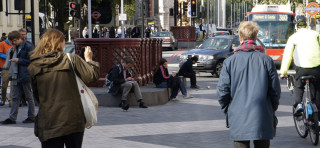PhD fellowship: Design for the Nordic Digital City

Urban environments, digital data and media are increasingly interconnected. Digital technologies are becoming integral to urban and civic life in terms of public services, commerce, media, culture and education. The digitalisation of urban cultures, businesses and public sectors presents new problems but also possibilities for design, architecture and planning. Addressing this development requires interdisciplinary collaboration. Currently, the digital design sector is increasingly working on projects that involve ‘smart city’ planning and governance as well as digitalisation of urban services. At the same time, architects and urban planners proactively seek to engage with the new possibilities and expectations that the digitalisation of cities and urban living creates.
Within research there is a need to mobilise interdisciplinary competencies and perspectives on the urban digital. This has two reasons. One is that the city or the urban phenomenon in itself is multidimensional and interdisciplinary. The other is that in order to make the best use of digital resources in the urban realm, we must go beyond established limits of disciplinary specialisation to see how technology, design and urban practices can be joined up in new and innovative ways.
When it comes to theory building, the Digital Urban Living project aims at establishing conceptual frameworks that make for a better understanding of how the urban condition, seen as an evolving field of possibilities, can inform future notions of digital cities and urban liveability. The clue for success herein lies in the overall conceptual framing of urban cultures and resources as both dynamic and transgressive, as hinted at by the phrase “seeing like a city” (Amin & Thrift, 2017). By tapping into such urban resources, through ‘close readings’ and fine-grained designing of digital urban services, our aim is to enable informed speculation about future possibilities and challenges for sustainable urban living.
Proposed research
This PhD should be developed in relation to the following overarching research questions: How can insights across the disciplines of urbanism (architecture, planning and urban studies etc.) and digital design (interaction and service design etc.) be combined to create new knowledge about potentials for digital urban living? How can new digital urban services be designed and developed in terms of the sharing of social and cultural resources, civic engagement and urban learning? What international experiences, theories and insights be brought together in ways that address Norwegian and Nordic issues and concerns in the development of digital urban services and cities, and vice versa: what does the Nordic context for the development of digital urban services contribute in terms of theory building and design practices? These questions may be approached by focusing on one, or combining several, of the following research areas:
1: ‘Emerging digital services and urban culture’. This area examines how urban and civic technologies related to sharing of urban resources will impact the Nordic context in the near future. Social and cultural resources, opportunities and problems are to be identified in terms of their potential effect on urban and civic life. The PhD should explore interdisciplinary methods and insights to design, prototype and test how urban resources can be shared and activated in a contemporary Nordic setting. Scenarios and experimental prototypes of new services and scenarios could potentially be designed and developed in collaboration with selected experts from the project network and/or researchers and master students in interaction design and urbanism.
2: ‘Seeing like a city’. One important dimension in this area would be to ask how digital, urban data can be mobilized for purposes of knowledge building and urban learning. A PhD project in this area could focus on how the development of digital urban services is or can be informed by mapping and cultivation of urban resources, including the built environment, digital data, and social and cultural dimensions of urban liveability. This could include exploring how digital services can enhance forms of urban cultural engagement, use of city spaces and social interaction through the use of urban data.
3: ‘City voices’. This area focuses on the potential for implementing digital urban services across governance and civic life in order to enhance participation and civic engagement. It asks how digital urban services can be enlisted in order to facilitate local and democratic participation and engagement. Such an approach would address potential synergies and tensions between digital actors, local cultures and democracy in the face of sustainable urban transformation.
These areas relate to the research interests of the Digital Urban Living project. Recent publications and events are listed at: http://www.oculs.no/projects/digital-urban-living/
The application deadline is April 2nd 2018.
https://www.jobbnorge.no/en/available-jobs/job/148093/phd-design-for-the-nordic-digital-city



